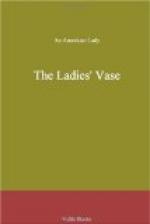Mrs. A. answered, “Indeed! we differ much in this respect. I am determined to make Fanny a superior woman, whatever it may cost me. Her father is of the same mind; he has a perfect horror of silly, empty-headed women; all our family are literary; Fanny will have little fortune, but we can afford to give her every advantage in her education, the best portion we can leave her. I would rather see her distinguished for talents, than for birth or riches. We have acted upon this intention from her birth. She already reads well, but I am sorry to say she hates it, and never will open a book unless she is obliged; she shows no taste for any thing but making doll’s clothes and spinning a top.”
At this moment a hearty laugh from little Fanny, who had set herself to play behind the curtain, drew my attention towards her. She was twice as big as my companion on the window-seat, though but a few months older; her broad, flat face, showed like the moon in its zenith, set in thin, silky hair: and with eyes as pretty as they could be, expressing neither thought nor feeling, but abundance of mirth and good-humor. The coloring of her cheek was beautiful; but one wished it gone sometimes, were it only for the pleasure of seeing it come again. The increasing seriousness of the conversation recalled my attention.
“I am surprised,” Mrs. W. was saying, “at your wishes on the subject. I am persuaded a woman of great talent is neither so happy, so useful, nor so much beloved, as one or more ordinary powers.”
“I should like to know why you think this,” rejoined her friend; “it appears to me she should be much more so.”
“My view of it is this,” Mrs. W. replied: “a woman’s sphere of usefulness, of happiness, and of affection, is a domestic circle; and even beyond it, all her task of life is to please and to be useful.”
“In this we are quite agreed,” said Mrs. A.; “but, since we are well set for an argument, let us have a little method in it. You would have your child useful, happy, and beloved, and so would I; but you think the means to this end, is to leave her mind uncultivated, narrow, and empty, and consequently weak.”
“This, is not my meaning,” replied Mrs. W.; “there are many steps between stupidity and talent, ignorance and learning. I will suppose my child what I wish her to be, about as much taught as women in general, who are esteemed clever, well-mannered, and well-accomplished. I think it is all that can contribute to her happiness. If her mind is occupied, as you will say, with little things, those little things are sufficient to its enjoyment, and much more likely to be within her reach than the greater matters that fill greater minds. My less accomplished character will enjoy herself where your superior woman would go to sleep, or hopelessly wish she might. In short, she will find fellowship and reciprocation in every little mind she meets with, while yours is left to pine in the solitude of her own greatness.”




